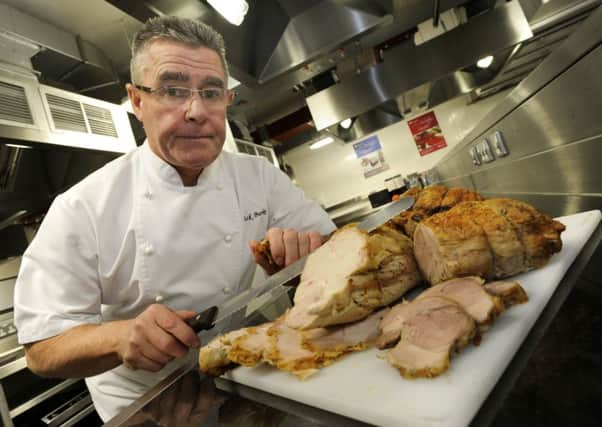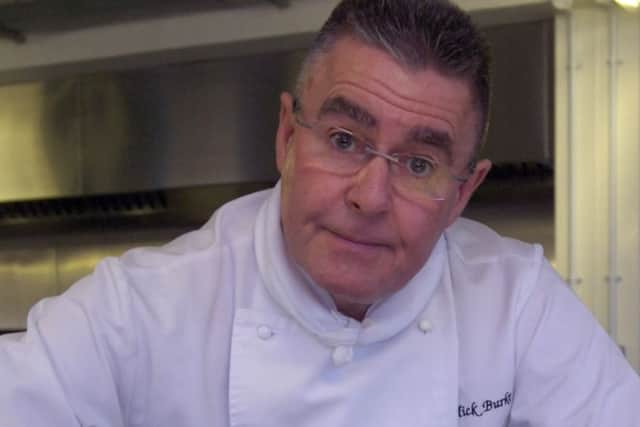'˜Star maker' chef hangs up apron after 37 years at Sheffield College


“I’ve been able to teach something I’m so passionate about – I saw an opportunity to come into something where I could pass on my experience and knowledge.”
Mick has taught thousands of college students the art of serving up fine food over 37 years and 109 days – a ‘very precise’ calculation, he observes.


Advertisement
Hide AdAdvertisement
Hide Ad“I think it needs to be, I have thoroughly enjoyed every minute and every day of it.”
Many of the 62-year-old’s star pupils have gone far indeed – Rupert Rowley, from Michelin-starred Baslow Hall, and Nathan Smith at the Old Vicarage, are among those who owe a debt to the lecturer once described as the ‘star maker’.
His contacts have enabled him to find placements for students in some of the industry’s top restaurants, and he’s wisely kept abreast of the latest trends in cookery to ensure his lessons are always up-to-date.
A talented pastry chef, he has written a book, Professional Patisserie, and won several awards, both national and international.


Advertisement
Hide AdAdvertisement
Hide Ad“In some ways it’s quite sad to retire, but at the same time I’ve had a fantastic life in catering education,” says Mick, who grew up in Bolton-on-Dearne.
His father, Jack, was a miner, working on the coal face as a ripper until he retired at 65, while Mick’s mother Kathleen worked in the pit canteen. He was the middle child of three, with an older brother, John, and younger sister, Patricia.
Mick blazed a trail somewhat by becoming the first boy to study domestic science at Pope Pius secondary school in Wath.
“In those days at school there was metalwork, woodwork and technical drawing, but at an early age I wanted to be a chef,” says Mick, who credits his cookery teacher, Mrs Lockyer, as a ‘real inspiration’.
Advertisement
Hide AdAdvertisement
Hide Ad“So I went along with my mum to school and we talked to Mrs Lockyer, and I joined the group. I was the first lad in the history of the school ever to do domestic science. After that lots of young chaps decided to follow on.
“In those days your main option was working in the pits. My parents never wanted me to take that career. I used to go home from school with a Quality Street tin filled with the buns I’d made, which made me quite popular really.”
Mick studied catering at Rotherham College of Arts and Technology, as it was then known, before entering the industry, training on the job with Ind Coope Hotels and Trust House Forte.
Listening to older colleagues’ tales of cooking in London, he learned the capital was where he needed to go ‘to see really fine dining’.
Advertisement
Hide AdAdvertisement
Hide Ad“I try and instil this now in our students in college,” he explains. “Sheffield is a great city but sometimes you need to move out of the city and look at London, and possibly abroad, and come back at a later date.”
He cites Rupert Rowley as an example – Mick introduced him to Baslow Hall’s owner, restaurateur Max Fischer, which led Rupert to work for Raymond Blanc, John Burton Race and Gordon Ramsay.“He had a wide breadth of learning, then moved back to Sheffield and finished up being head chef at Fischer’s.”
He admits to having a soft spot for Rupert, adding: “He’s been a fantastic ambassador for the college.
“He’s always been there if we’ve needed him to speak to students, in his own time, or give demonstrations.”
Advertisement
Hide AdAdvertisement
Hide AdMick went to London in the mid-1970s to work at the five-star Mayfair hotel Claridge’s. However, South Yorkshire soon called him back, and he returned to take up a post at the Grosvenor House Hotel as chef tournant – relief chef – who is called upon to prepare everything from sauces to pastry.
“In those days in Sheffield if you wanted to go out for a meal you would be going to a hotel – you didn’t have restaurants scattered around the city like you have nowadays,” he recalls.
“I have a lot of fond memories of working there.”
He then turned to a career in education, taking his City and Guilds at Granville College, precursor to Sheffield College, and started leading classes in 1979.
Showing students how to observe ‘tidy working practices’ has been one of his most important lessons, Mick believes.
Advertisement
Hide AdAdvertisement
Hide Ad“If you’ve got to put 20 pieces of fish on a tray, I want to see it prepared and placed on that tray correctly - in a straight line. It’s about precision. Once that is in place you can start looking at developing someone’s culinary skills. Otherwise you’re fighting a bit of a losing battle.
“We’re teaching them vocational skills but also employability skills that are really important. There are jobs everywhere in catering – there’s a niche for everyone.”
Mick does all the cooking at home – daughters Frankie, 23, and Jess, 27, still gather round the table for family meals with boyfriends. But his wife of 33 years, Jill, 56, ‘does a mean Sunday lunch’, he admits.
“The kids think her gravy is a lot better than mine. I like to eat good, well-cooked quality food whether that’s fine dining or casual dining. I enjoy a good curry!”
Advertisement
Hide AdAdvertisement
Hide AdChocolate is one of Mick’s favourite ingredients – he has previously named chocolate brioche pudding as his signature dish.
Mick decided to step down from the college as he ‘just wanted to do other things’. Friends, staff and former students held a farewell lunch for him at the Copthorne Hotel, Bramall Lane, where there was a big turnout.
“Thirty-seven years and 109 days is a long time. I just felt it was the right time for me to step down and see what else is out there, to be honest.”
Two years ago Mick was made a fellow of the Master Chefs of Great Britain, an invitation-only association – “That was endorsement by the industry and something I’m very proud of” – and this week he will be at the NEC in Birmingham to judge at the Hospitality Show, the biggest catering event on the calendar.
Advertisement
Hide AdAdvertisement
Hide AdHe’ll still be helping out at the college, though. Mick had a hand in creating a tasting menu there last week - he was in the restaurant kitchen at 7am and left at 10pm.
“I’ll be available to assist,” he says. “Sheffield College has been a very good place for me.”
The Universal Language of Cuisine
Mick Burke’s time at Claridge’s started with a gamble when he travelled to London with two other young chefs in the hope of securing employment.
“We got an overnight bus and arrived in Victoria at a ridiculous time – 5am – with no job. We just phoned up the hotels – the Hilton, the Connaught and Claridge’s.
We were offered interviews in all three.”
Advertisement
Hide AdAdvertisement
Hide AdMick worked as late guard, making dishes after hours. He was working on the night an IRA bomb went off outside nearby Selfridge’s in ecember 1974 – “I felt the hotel shake” – and remembers one New Year’s Eve when he experienced the job’s lonelier side.
“I was once again on late guard and was given a room in the hotel over the entrance of Claridge’s. I phoned home and was speaking to my family all letting in the New Year and I was by myself in this marvellous suite that someone would probably pay fortunes for, but didn’t really mean a lot.”
But generally the hotel was ‘an amazing experience’, says Mick, who cooked for state occasions and Royal banquets as one of 80 chefs, most of whom were French.
At the time, the menus were written in French and orders were called out in the language too, so Mick faced a steep learning curve to brush up on the terminology.
“It’s the universal language of cuisine,” he reasons. “In catering it still is to some degree.”